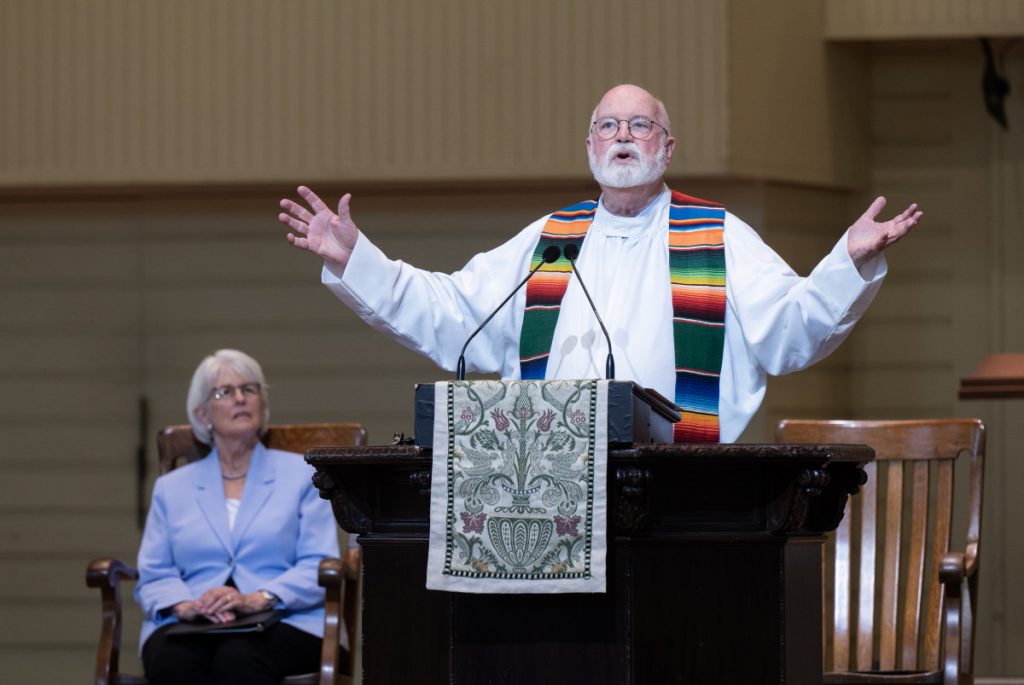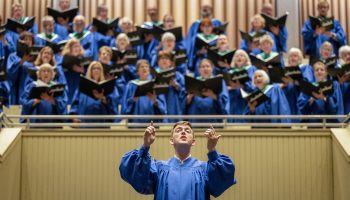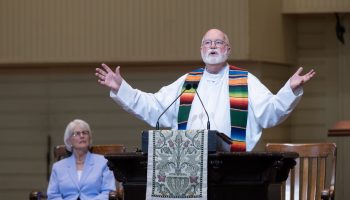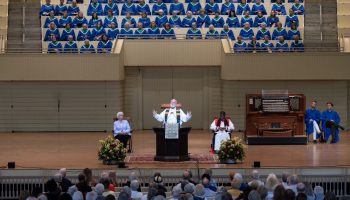
Fr. Greg Boyle delivers his sermon in the Amphitheater.
The poet Rumi wrote: “If the house of the world is dark, love will find a way to make windows.” Fr. Greg Boyle, S.J., said: “The narrow way is the path and the gate is love.”
Boyle preached at the 9:15 a.m. Tuesday morning worship service in the Amphitheater. His sermon title was “Narrowness is the way,” and the scripture reading was Matthew 7: 6; 12-14, the narrow gate and the hard road lead to life.
Boyle began his sermon with a story of a retreat for his 1972 high school class.
“We are 30 old geezers sitting in a room,” he said. “Someone makes a presentation and then we go to our rooms and reflect and write and then come back to share.”
During the sharing time, one man said he realized he needed to listen to his wife more. Another agreed that was what he needed to do.
Another classmate, Sean, said the answers reminded him of a story.
A man was driving up a narrow, windy, mountain road and narrowly passed a woman driving down the road. The woman shouted at him, “Pig.” The man shouted back, “Bitch.” The man came around a hairpin turn and saw an enormous pig. He crashed into the pig and died.
“The moral of the story,” Sean said, “is we should listen to women more.”
The congregation laughed and applauded. “I had no idea that would be an applause line,” Boyle said.
Boyle has been paying attention to women mystics, women like Julian of Norwich, Teresa of Ávila, Thérèse Lisieux and Mechthild of Magdeburg. They believed love begets love.
“These women found an anchor born of love that can’t be agitated,” he said. “Mechthild believed that if you lived by love, you would not have to say anything at all. She criticized the church for stepping away from growing a community of love to reciting rules and beliefs.”
Thérèse Lisieux believed that her vocation was to love and saw the narrow way as a way of sidestepping the ego, to move outside oneself to others.
Gary and Terry, twins, were Homeboys who, at age 9, were taken away from their parents because of drugs and abuse and sent to live with their grandmother, who was more abusive. They ran away after a year.
On weekends, she would make them strip to their underwear and sit in a darkened hall in silence. Sometimes she would put duct tape on their mouths. She told them she hated the sound of their voices. Gary told Boyle once, very deliberately, “This is why I never shush my kids.”
“Love finds a way and is the way, the undisputed champion that feeds the stomach of the soul,” Boyle said. “The narrow way is singularly about love.”
When asked to testify at death penalty trials, Boyle always says yes. He does not always know the defendants, but he is opposed to the death penalty.
“The death penalty does not make us safer, it makes us lesser,” he said.
He said that in one case, the district attorney began in a very nice way, saying to Boyle, “You seem like a kind, gentle, nice man. You are Santa Claus.” Boyle responded, “Your honor, I would like the words ‘Santa’ and ‘Claus’ stricken from the record.” The judge and jury laughed.
The district attorney then shifted tactics. He said to Boyle, “You preach every Sunday. You preach on evil.” Boyle replied no. The district attorney said, “You don’t preach on evil. What do you preach on?”
In his squeakiest teenage voice, Boyle said, “Love.” The defendant did not get the death penalty.
There is a Tibetan saying that where you have received the most love is home.
“Love is the way and loving is home,” Boyle said. “There is a joy in loving without regard for return. Love is home and there you are never homesick.”
Youngster and Puppet were two Homeboys from rival gangs. Youngster was going to be working in the same enterprise as Puppet. Youngster told Boyle, “I can work with my rivals but I won’t talk to them.”
Boyle told the Chautauqua congregation, “This has always bothered me because humans can’t sustain demonizing when they get to know others.”
Youngster went through the ritual of shaking hands with his new co-workers until he came to Puppet. Puppet did not want to engage and stared at his shoes. They mumbled something to each other. The hatred was very personal. Boyle told Youngster, “If you can’t hang working with Puppet, there are other people who want this job.”
Six months later, Puppet walked to a store and took a shortcut home. He was surrounded by 10 members of a rival gang who literally kicked the life out of him.
Boyle was called from a conference and went to the hospital. The hospital has a protocol to keep people connected to life support for 48 hours to be sure there is no brain activity. Boyle blessed Puppet, anointed him with oil, and a week later buried him.
Youngster called Boyle at his office within 24 hours of the beating and said, “That’s messed up. What happened?” Boyle agreed it was messed up. “Can I do anything? Give blood or something?” They were silent for a while and then Youngster said, “He was not my enemy. He was my friend; we worked together.”
The way is narrow but consequential.
“We have to return to the orthodoxy of love, to love our enemies, to find a way not to have enemies,” Boyle said. “We have to welcome the tenderness of God and pour it out to the world that could use it.”
He continued: “The God who loves the sound of our voices sends us into the dark house of the world confident that only love can find the way to make windows.”
The Rev. J. Paul Womack, pastor of Hurlbut Memorial Community United Methodist Church, presided. Deborah First, a year-round Chautauquan who was instrumental in first bringing the Homeboys to Chautauqua, read the scripture. The prelude was “Meditation on Picardy,” by Leo Sowerby, played by Joshua Stafford, director of sacred music and Jared Jacobsen Chair for the Organist. The Chautauqua Choir sang “O for a closer walk,” with music by C.V. Stanford and words by William Cowper, under the direction of Stafford. The postlude was “Psalm 29,” by Emma Lou Diemer, played by Stafford. Support for this week’s chaplaincy and preaching is provided by the Edmund E. Robb-Walter C. Shaw Fund and the Lois Raynow Department of Religion Fund.




